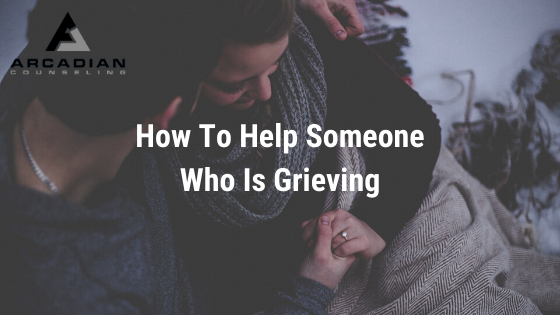Watching someone you care about suffer with grief and loss can feel helpless. For many of us, we don’t know what to say or we fear we may say the wrong thing, so we don’t say anything at all. Maybe we assume they just want to be left alone because it’s what we would want. So, we leave them alone.
For many, it’s simply easier to offer a virtual hug or send a text instead of picking up the phone or talking face-to-face. But remember, the most difficult things for us to do are what can be the most helpful to someone grieving a loss.
As a grief counselor, I often hear from grieving clients how hurt or betrayed they feel because a particular friend or loved one never reached out to them to in their time of pain and suffering. Countless times, I’ve seen friendships and relationships ruined over this. Don’t be that friend.
Here are 6 ways to comfort and support someone struggling with grief and loss.
Just Listen
When someone is grieving, they usually hear empty clichés such as: “Don’t worry, they’re in a better place now” or “At least she didn’t suffer” or “When it’s your time, it’s your time.” I’ve never had a client tell me these types of statements made them feel better, understood, or validated. Never.
Instead of offering an empty cliché, that will only invalidate what they’re feeling – listen. Really listen. Ask them about their loved one by name. “Tell me about Mark.” Encourage them to talk about their memories. Encourage, not push.
If you don’t know what so say. Say just that. “I’m really sorry you’re in such pain. I don’t know what to say, but I’m here to listen or for anything else you need.” Trust me, that’s a thousand times more comforting than some silly cliché.
Encourage Them To Feel Their Feelings
Let’s be honest, for many of us, when someone is expressing painful feelings it can be uncomfortable to hear. Maybe we don’t know what to say or maybe it triggers something in us. Our natural inclination is to try distract them (or us) from their feelings.
“Let’s get you out for some fun!”
“Come on, we need to take your mind off this; let’s watch a movie or play a game!”
While these suggestions are well-intentioned, all they do is encourage distraction from feelings. While this may work temporarily, those painful feelings will come back – and they will continue to come back until they are processed, acknowledged, and accepted.
Sometimes we need to feel our feelings. They are there for a reason and they’re usually trying to tell us something. No other time is this more evident and critical than during the grieving process.
Don’t Compare
No matter how much you loved your father, chances are it’s not the same for someone else. Maybe your father was the best father on the planet and your relationship was perfect. Maybe your friend’s father wasn’t around growing up and their relationship was strained. This is called complicated grief. They’re not only grieving the loss of their father, but they’re grieving the lost opportunity for a rekindling of that broken relationship.
Don’t assume you know what they’re feeling or what it’s like for them. It almost never is.
Give a gift or memento
Simple gestures such as a card, plant or other small gift can bring comfort to someone grieving. For some, it can be easier to approach them if you have a small card or gift in tow. If they’re a person of faith, then be sure to get an appropriately themed card or book to encourage them to lean on their faith.
Offer Help
Don’t just say, “Let me know if you need anything.” Offer specific help such as bringing a meal on a particular day, running an errand for them or helping with childcare or housework. You can also ask, “What can I do to help?” Then actually do it. Sometimes we let our friends and loved ones down with forgetfulness, but this is not the time. If they say, “nothing” then ask again later. And keep asking.
Check In a Little & Often
Life gets away from us. It can be hard to remember to follow up. So set a reminder to check up on your friend. Give them a call, shoot them a “thinking of you” text, drop by to visit them and see how they’re doing. Don’t fool yourself by telling yourself, “Oh, they’ll reach out when they’re ready.”
If you or a loved one is struggling with grief and loss, reach out for help. Suffering through grief alone is not the answer – and it doesn’t work.
James Killian, LPC is the Principal Therapist & Owner of Arcadian Counseling in New Haven, CT where they specialize in helping over-thinkers, high achievers, and perfectionists take control and move From Surviving to Thriving.







